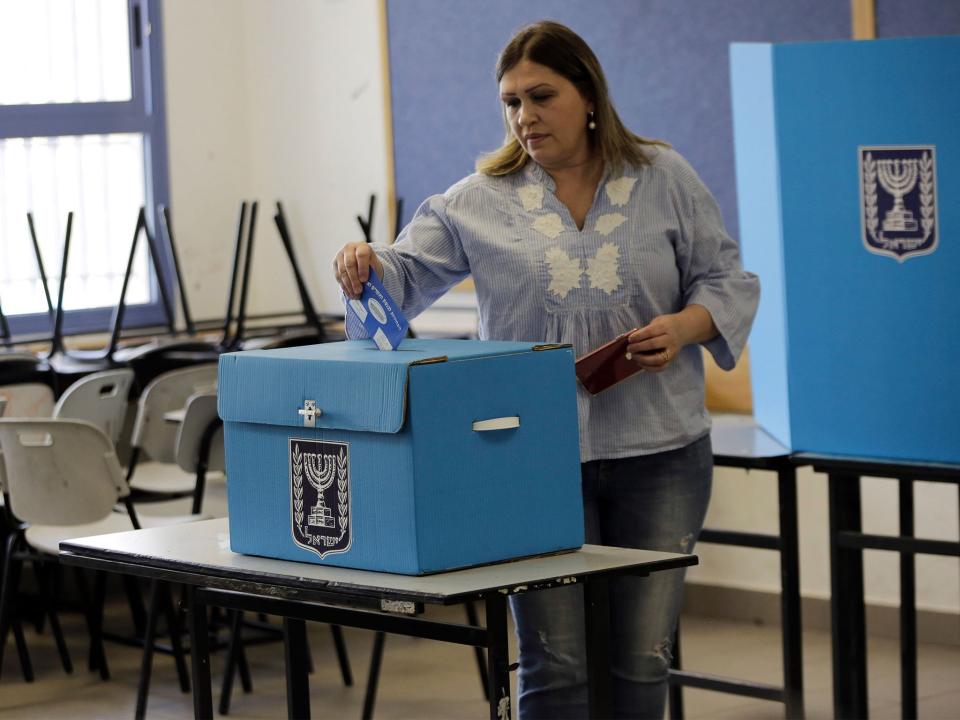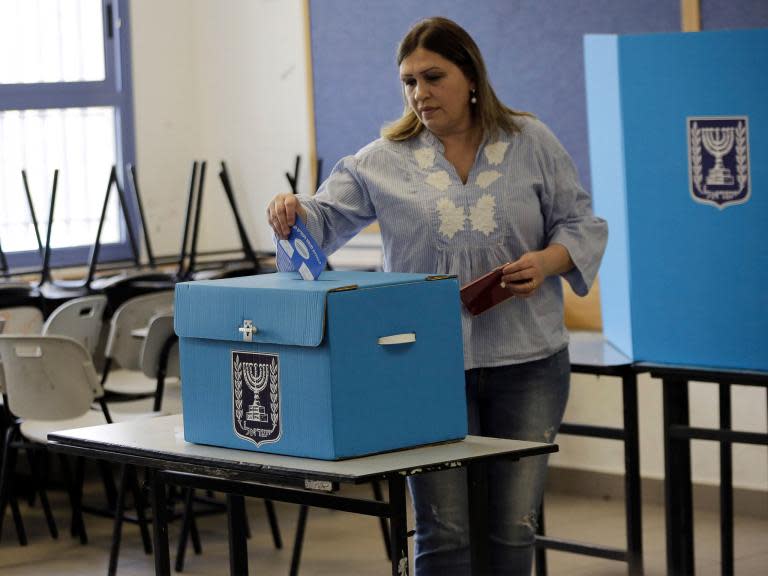Israel: Amid a fraught general election, Israeli voters paint a picture of a nation divided
“Let’s start with anything but Bibi”, said Lilach Nasini, one of Israel’s six million voters, as she cast her ballot in Tel Aviv during the country's knife-edge elections.
Her words echoed a number of voters The Independent spoke to in the country’s commercial capital. Many opted for Benjamin Netanyahu’s main rival, ex-army and election newcomer chief Benny Gantz.
It was a stark contrast to areas of Jerusalem, where voters warned that the country would collapse without the incumbent premier.
“Thirteen years isn’t enough, he’s barely begun, we’ll take another decade,” one elderly gentleman said as he left a polling station near the ultraorthodox neighbourhood of Mea Shearim after voting for Netanyahu’s right-wing Likud party.
Walking over a street strewn with Netanyahu flyers, Ami Green, another Likud voter added: “Israel is a tough neighbourhood we need someone strong who has experience – not someone playing at this. Simply put, without Bibi there will be war.”
Tuesday’s fraught general election set Israel’s right-wing prime minister, Mr Netanyahu, who hopes to secure the title of Israel’s longest serving premier against Lt Gen Gantz, a former army chief who formed a centrist alliance despite never being in politics before.
The final polls, published on Friday, gave Mr Gantz’s Blue and White party a mere one-seat lead over the Likud in the 120-seat parliament or Knesset. But they also predicted a right-wing bloc would eventually triumph over a centrist or left one, meaning the Likud would likely be chosen to form a ruling coalition.
With the results so up in the air, both sides have fought a fierce battle to secure the swing votes.
Mr Netanyahu, who has campaigned under the shadow of possible corruption charges, in the eleventh hour urged right-wing voters to head to the polling stations, saying turnout at Likud strongholds had been too low.
He later filmed himself at the beach in Netanya, telling people to head to the polling stations or “wake up tomorrow to a leftist government.”
Benny Gantz’s coalition partner, opposition leader Yair Lapid, meanwhile, said that their party needed just “two more seats”.
“A vote for any party except Blue and White is a vote for Netanyahu,” he warned.
On the ground, the polling stations in different areas voters appeared bitterly divided, as many said the election was really a referendum on Mr Netanyahu's 13-year-old right-wing rule.
“Gantz will be different. Unlike Bibi, who is one, Gantz is four people. As they say a new broom is a good broom,” said Avi Barshavsky, a 67-year-old taxi driver form Rishon Leziyyon who voted Blue and White.
“We need to stop this corruption. It’s not nothing that he has four cases of corruption and a breach trust case against him. If there’s smoke there’s fire,” he added.
Across town in the Arab neighbourhood of Jaffa, Arab-Israeli citizens were also voting for Mr Gantz.
“I’m only voting Gantz because my top priority is to replace Bibi,” said one. “It’s the most realistic way.”
Back in Jerusalem in the Israeli settlement of Pisgat Ze’ev, settler voters said they would do everything in their power to keep Mr Netanyahu. Particularly after he vowed to annex the occupied West Bank if he won, which is illegal under international law, but a key demand of the far right.
They dismissed corruption cases against the prime minister, saying it was “plot by the left” to unseat him because they couldn’t beat him in elections.
“For us, a Blue and White win would be a disaster – not because of Gantz but because of his coalition partner Lapid, we need to protect the right,” said Yossi Shkalo, 20, a religious student.
In the Arab neighbourhoods of Jerusalem, most Arab-Israelis were voting for Arab parties like Ahmed Tibi’s Arab Movement for Change coalition and dismissed both Mr Gantz and Mr Netanyahu as “choosing between the bad and the worst”.
Disillusionment in the elections process and anger at rising levels of racism in Israel, after Netanyahu’s divisive campaign tactics, had driven a noisy boycott movement. Many were angered by legislation pushed through by Mr Netanyahu that declared Israel to be the nation-state of the Jewish population.
Prominent Israeli pollster Camil Fuchs warned that Israel has never seen such a decline in Arab turnout, calling it “the biggest drama” facing the national election.
Veteran Arab politician Ahmad Tibi called the low turnout “a real danger” to his party and the other Arab factions.
“A lot of friends think we have to boycott the elections saying it’s pointless,” Said Khalil, 29, from Haifa, a mixed Arab and Jewish town who only decided to vote at the last minute. “Our struggle in the street is more essential and important but I think we need a voice in the Israeli Knesset. We cannot be shut out of the conversation.”


